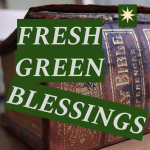
Genesis 9:8-17: Then God said to Noah and to his sons with him, (1) “As for me, I am establishing my covenant with you and your descendants after you, and with every living creature that is with you, the birds, the domestic animals, and every animal of the earth with you, as many as came out of the ark. (2) I establish my covenant with you, that never again shall all flesh be cut off by the waters of a flood, and never again shall there be a flood to destroy the earth.” (3) God said, “This is the sign of the covenant that I make between me and you and every living creature that is with you, for all future generations: (4) I have set my bow in the clouds, and it shall be a sign of the covenant between me and the earth. (5) When I bring clouds over the earth and the bow is seen in the clouds, I will remember my covenant that is between me and you and every living creature of all flesh; and the waters shall never again become a flood to destroy all flesh. (6) When the bow is in the clouds, I will see it and remember the everlasting covenant between God and every living creature of all flesh that is on the earth.” (7) God said to Noah, “This is the sign of the covenant that I have established between me and all flesh that is on the earth.” (NRSV)
∞∞∞∞∞∞∞∞
Anthropocentrism as a way of thinking and perceiving focuses on the primacy of humans, over and above all other animal and plant life. As the eco-theologian John Cobb notes, we are all rather anthropocentric, though it varies by degree. We rightly recognize that many Native American religions challenge our human-centered views with a recognition of the spirit of a river, mountain, tree, or animal.
We tend to regard the Judeo-Christian tradition as anthropocentric. There are good reasons for this. European explorers and Bible-thumpin’ settlers came to the Americas with their other-worldly, Heaven-focused theologies. They raped the New World and laid waste to land, plant life, and animals (as well as the indigenous peoples) proclaiming that such work was their destiny owing to their God.
It is surprising to find that the Bible those pioneers were thumpin’ often stands in direct opposition to anthropocentric thought. It does emphasize the covenantal relationship between God and humanity, but a human-centered reading misses much. After the flood narrative, God speaks of his covenant seven times. The covenant is far vaster than human concern, all seven times it embraces all earthly creatures, as well as the Earth itself: (1) and with every living creature..the birds, the domestic animals, and every animal of the earth…as many as came out of the ark. (2) never again shall all flesh be cut off by the waters of a flood, and never again shall there be a flood to destroy the earth. (3) between me…and every living creature…for all future generations: (4) between me and the earth. (5) between me…and every living creature of all flesh; and the waters shall never again become a flood to destroy all flesh. (6) the everlasting covenant between God and every living creature of all flesh that is on the earth. (7) between me and all flesh that is on the earth.
It is a testimony to the power of our anthropocentric presumptions that humans have ignored this seven-fold wallop of God. It is chilling, but perhaps not surprising – just express empathy or concern for animals or plants and note the reaction. And at the center of these seven ancient sacred proclamations, in the fourth one, God’s promise is most succinct, It is a “covenant between me and the Earth.”
∞∞∞∞∞∞∞∞
You may (or may not) push against the other-worldly, Heaven-focused theologies of your ancestors, but do you question their anthropocentric worldviews? Name a place in your concern that is not human-centered. Place that concern into the center of your meditation. What action might you take this week regarding your non-anthropocentric concern? How might you habitually keep non-human-centered concerns in your purview?
(Music: Courtesy of Adrian Von Ziegler, “Circle of Life.” )